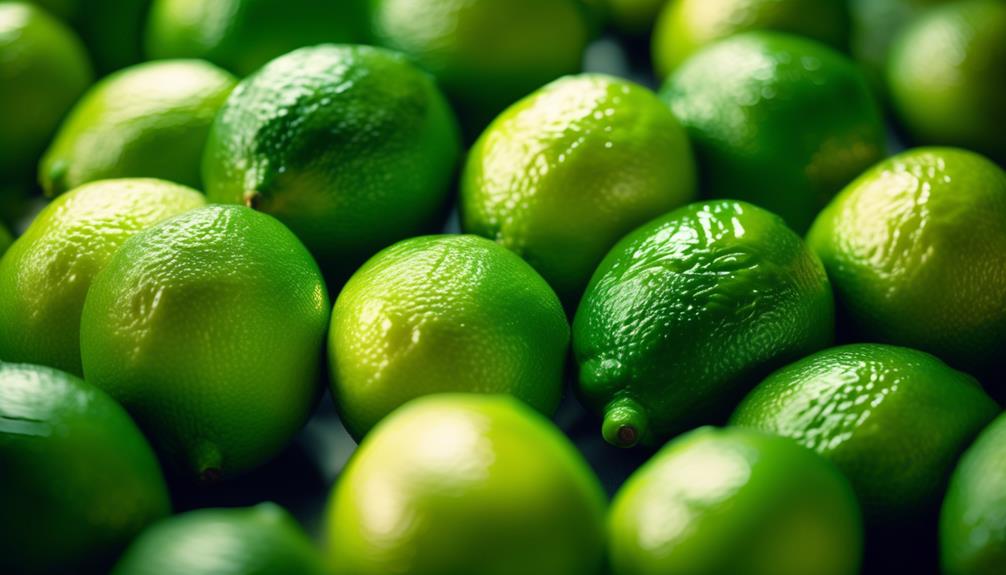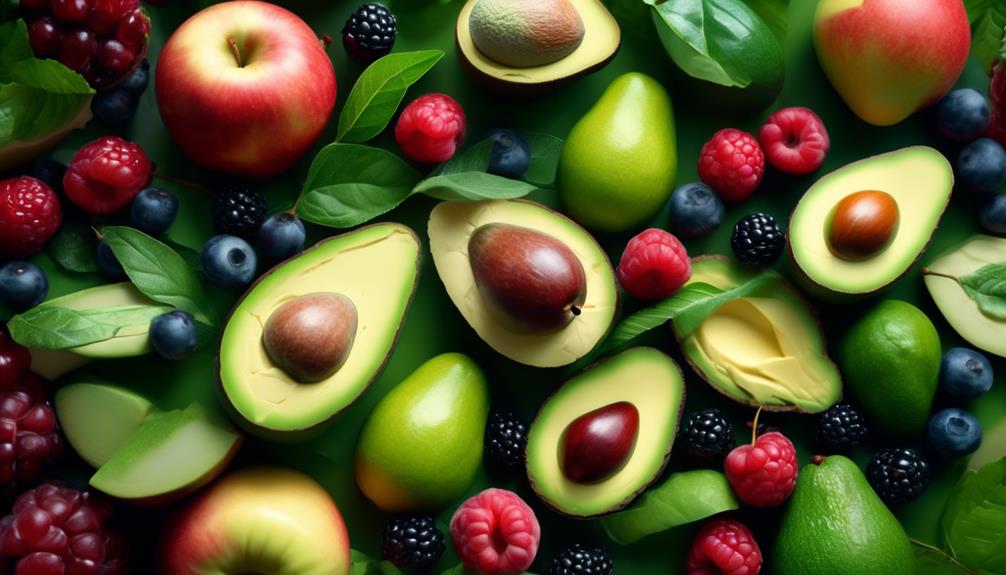Looking to maintain a low-carb diet while still enjoying some fruity goodness? Well, you're in luck!
When it comes to finding the best low-carb fruits for a keto diet, there are a few options that will keep you on track without sacrificing taste.
So, which fruits should you reach for? Stay tuned as we explore the top contenders that will leave you feeling satisfied and guilt-free.
Strawberries

Strawberries are a delicious and nutrient-rich fruit that can be enjoyed on a low-carb ketogenic diet. With only 7 grams of net carbs per cup, they're a great addition to your daily meal plan. Not only are strawberries low in carbs, but they're also packed with vitamins, minerals, and antioxidants that can benefit your overall health.
One popular way to incorporate strawberries into your keto diet is by making strawberry smoothies. You can blend them with unsweetened almond milk, a scoop of protein powder, and a handful of spinach for a nutritious and refreshing drink.
Another option is to use strawberries in desserts. You can make a low-carb strawberry cheesecake by using almond flour for the crust and a sugar substitute for the sweetener. This way, you can satisfy your sweet tooth while staying within your keto macros.
When it comes to enjoying strawberries on a low-carb diet, it's important to keep portion sizes in mind. While strawberries are relatively low in carbs, they still contain some natural sugars. Moderation is key to ensure you stay within your daily carb limit.
Avocado
Avocado is a nutritional powerhouse that's perfect for a keto diet. With its high content of healthy fats and low net carb count, it's an ideal choice for those following a low-carb eating plan.
Not only is it nutritious, but it's also incredibly versatile in the kitchen, making it a staple ingredient for a variety of keto-friendly recipes.
Nutritional Benefits
With its rich nutritional profile, incorporating avocado into your keto diet can provide numerous health benefits.
Avocados are packed with healthy monounsaturated fats, which can help reduce inflammation, improve heart health, and support weight loss. They're also a good source of fiber, which aids in digestion and promotes feelings of fullness.
Avocados are rich in vitamins and minerals, including potassium, vitamin K, vitamin E, and vitamin C. These nutrients contribute to healthy skin, strong bones, and a strong immune system.
Additionally, avocados are low in carbohydrates and high in healthy fats, making them an excellent choice for those following a keto diet.
You can enjoy avocado in various ways, such as in salads, as a topping for grilled meats or fish, or even as a base for a creamy keto-friendly smoothie.
Net Carb Content
Incorporating avocado into your keto diet not only provides numerous health benefits, but it also offers a low net carb content, making it an ideal choice for those following a low-carb lifestyle.
Avocados are known for their creamy texture and rich taste, but they also pack a nutritional punch. When it comes to net carb content, avocados are incredibly low. A typical medium-sized avocado contains around 9 grams of total carbs, but an impressive 7 grams of those carbs are fiber.
This means that the net carb content of an avocado is only 2 grams per serving. The high fiber content helps slow down digestion and keeps you feeling full for longer.
Versatile Culinary Uses
You'll be amazed at the versatile culinary uses of this creamy and nutrient-packed fruit. Avocado isn't only delicious on its own, but it also adds a unique twist to a variety of dishes.
Its rich and creamy texture makes it a perfect base for dips and spreads. Guacamole is a classic example, but you can also use mashed avocado as a substitute for mayonnaise or butter in sandwiches and wraps.
Avocado can also be sliced and added to salads, giving them a creamy and satisfying element. Additionally, this fruit pairs well with a wide range of flavors. It complements citrus fruits, tomatoes, and spicy ingredients, adding a creamy and cooling element to balance out the flavors.
The culinary benefits and flavor pairings of avocado make it a versatile and delicious ingredient to incorporate into your keto diet.
Blackberries
Blackberries are a great addition to your keto diet due to their low-carb content. These berries are packed with essential nutrients like fiber, vitamin C, and antioxidants, which can support your overall health.
Incorporating blackberries into your diet can also provide benefits such as improved digestion, reduced inflammation, and enhanced immune function.
Nutritional Value
When it comes to the nutritional value of blackberries, you'll find that they're packed with essential vitamins and minerals. Here is a breakdown of their nutritional profile:
- Vitamins: Blackberries are rich in vitamin C, providing about 25% of your daily recommended intake in just one cup. This powerful antioxidant helps boost your immune system and promote healthy skin.
- Minerals: Blackberries are a good source of potassium, which plays a crucial role in maintaining proper heart function and regulating blood pressure.
With their low carb content, blackberries are a great choice for those following a keto diet. They can be incorporated into various low carb fruit recipes or added to low carb fruit smoothies to add flavor and natural sweetness.
Enjoy these delicious berries while reaping their nutritional benefits!
Health Benefits
As you incorporate blackberries into your keto diet, you'll discover the numerous health benefits they offer.
Blackberries aren't only low in carbs, but they're also packed with essential nutrients that support your overall health. These berries are rich in antioxidants, which help to protect your body against harmful free radicals and reduce the risk of chronic diseases.
Blackberries also contain fiber, which aids in digestion and promotes a feeling of fullness, making them an excellent choice for weight loss. Additionally, the high vitamin C content in blackberries can boost your immune system and support collagen production for healthy skin.
With their delicious taste and impressive health benefits, blackberries are a great addition to your keto diet.
Raspberries

Raspberries are a delicious and low-carb fruit option for those following a keto diet. They not only add a burst of flavor to your meals but also come with numerous health benefits. Here's why you should consider incorporating raspberries into your keto diet:
- Raspberry Recipes:
- Raspberry Smoothie: Blend raspberries with unsweetened almond milk and a scoop of low-carb protein powder for a refreshing and nutrient-packed smoothie.
- Raspberry Salad: Toss raspberries with mixed greens, feta cheese, and a drizzle of olive oil for a light and satisfying salad.
- Raspberry Health Benefits:
- Low in Carbs: Raspberries are relatively low in carbs, containing only 7 grams of net carbs per cup, making them a suitable choice for a keto diet.
- Rich in Fiber: With 8 grams of fiber per cup, raspberries promote healthy digestion and can help you feel fuller for longer.
- High in Antioxidants: Raspberries are packed with antioxidants that protect your body against oxidative stress and inflammation.
- Vitamins and Minerals: These berries are a good source of vitamin C, manganese, and vitamin K, which contribute to overall health and well-being.
Incorporating raspberries into your keto diet not only adds variety but also provides you with essential nutrients and health benefits. So go ahead, enjoy this delicious fruit in your meals and embrace the goodness it brings to your keto lifestyle.
Watermelon
Watermelon is a refreshing and hydrating fruit that can be enjoyed on a keto diet. Despite being sweet and juicy, watermelon is relatively low in carbohydrates, making it a suitable choice for those following a low-carb eating plan.
When it comes to nutritional benefits, watermelon is an excellent source of vitamins A and C, which are important for immune function, skin health, and eye health. It also contains lycopene, a powerful antioxidant that has been linked to a reduced risk of certain types of cancer and heart disease. Furthermore, watermelon is rich in water, which can help keep you hydrated and aid in digestion.
Culinarily, watermelon can be enjoyed in a variety of ways. It can be eaten as a refreshing snack on its own or added to salads for a burst of sweetness. Watermelon can also be used to make refreshing beverages like agua frescas or infused water. Additionally, it can be blended into smoothies or frozen to make a delicious and guilt-free summer treat.
Cantaloupe

Cantaloupe is a delicious and nutritious fruit that can be incorporated into a keto diet due to its low carbohydrate content. Here's why you should consider adding cantaloupe to your keto meal plan:
- Low in carbs: Cantaloupe is relatively low in carbohydrates, making it a suitable option for those following a keto diet. A 100-gram serving of cantaloupe contains only 8 grams of net carbs, making it a great choice for maintaining ketosis.
- Rich in vitamins and minerals: Cantaloupe is packed with essential vitamins and minerals. It's an excellent source of vitamin C, providing over 100% of the recommended daily intake per serving. It also contains vitamin A, potassium, and folate, which are crucial for maintaining overall health.
- High in water content: Cantaloupe has a high water content, making it a hydrating choice for hot summer days. Staying hydrated is essential when following a keto diet, and cantaloupe can help you meet your daily fluid requirements.
- Versatile and delicious: Cantaloupe can be enjoyed in various ways on a keto diet. It can be eaten on its own as a refreshing snack, added to salads for a burst of sweetness, or even used in keto-friendly smoothies. There are plenty of delicious cantaloupe recipes available to keep your taste buds satisfied.
Incorporating cantaloupe into your keto diet can provide you with a sweet and nutritious option while keeping your carb intake in check. Enjoy the benefits of this tasty fruit while staying on track with your keto goals.
Lemons
If you're looking for another low-carb fruit to incorporate into your keto diet, consider adding lemons to your meal plan. While lemons may not be the first fruit that comes to mind when thinking about a low-carb diet, they can be a great addition due to their culinary uses and health benefits.
Lemons are commonly used in cooking and baking to add a tangy flavor to dishes. Their juice can be used as a natural marinade for meats or as a dressing for salads. Additionally, lemon zest can add a bright and refreshing flavor to various recipes. This makes lemons a versatile ingredient in the kitchen.
In terms of health benefits, lemons are packed with vitamin C, which is known for its immune-boosting properties. They also contain antioxidants that can help reduce inflammation in the body. Moreover, lemons are low in calories and carbohydrates, making them a suitable choice for a keto diet.
When incorporating lemons into your keto meal plan, be mindful of their carb content. While lemons themselves are low in carbs, their juice can contain a moderate amount of carbohydrates. It's best to use lemon juice in moderation and account for its carb content when tracking your daily intake.
Limes

Limes aren't only a flavorful addition to your meals, but they also offer a variety of nutritional benefits.
Packed with vitamin C, limes can support a healthy immune system and promote collagen production.
Additionally, their low carbohydrate content makes them a great choice for those following a keto diet.
Incorporate limes into your recipes to add a tangy twist while staying within your low-carb goals.
Nutritional Value of Limes
With a vibrant green color and tangy flavor, limes offer a refreshing addition to your low-carb keto diet. Here's why you should consider including limes in your meal plan:
- Lime Health Benefits:
- High in vitamin C: Limes are a great source of vitamin C, which is essential for a healthy immune system and collagen production.
- Antioxidant properties: Limes contain antioxidants that help protect against cell damage and reduce inflammation in the body.
- Lime Recipes:
- Lime-infused water: Add a few slices of lime to your water for a refreshing and flavorful twist.
- Lime dressing: Create a zesty salad dressing by combining lime juice, olive oil, and herbs for a low-carb option.
Incorporating limes into your low-carb keto diet not only adds flavor but also provides important nutrients and health benefits. Try these lime recipes to enhance your meals and enjoy the refreshing taste of this citrus fruit.
Incorporating Limes in Recipes
Enhance your low-carb keto meals with the refreshing and tangy flavor of limes by incorporating them into a variety of delicious recipes.
Limes aren't only low in carbs but also packed with essential nutrients like vitamin C, antioxidants, and flavonoids.
Lime juice can be used as a versatile ingredient in both savory and sweet dishes.
For a zesty twist, add lime juice to marinades, dressings, and sauces to enhance the flavor of your favorite meats and vegetables.
You can also use lime juice in refreshing beverages like limeade or as a garnish for cocktails.
When it comes to desserts, lime desserts are a popular choice. Key lime pie, lime sorbet, and lime-infused cheesecakes are just a few examples of the delightful treats you can create using lime juice.
Get creative and start incorporating limes into your keto recipes for an added burst of flavor.
Tomatoes
Tomatoes are a versatile and nutrient-rich fruit that can be enjoyed on a low-carb keto diet. They aren't only delicious but also offer several health benefits.
Here are some reasons why you should consider incorporating tomatoes into your low-carb keto diet:
- Versatile Recipes:
Tomatoes can be used in a variety of low-carb recipes, such as salads, soups, and sauces. They add a burst of flavor and vibrant color to your dishes. Try making a tomato-based salsa or a refreshing gazpacho for a low-carb and satisfying meal option.
- Health Benefits:
Tomatoes are rich in vitamins A, C, and K, as well as antioxidants like lycopene, which has been linked to reduced risk of heart disease and certain types of cancer. They're also a good source of potassium, which supports heart health and helps regulate blood pressure. With only 3-4 grams of net carbs per 100 grams, tomatoes are a low-carb option that can be enjoyed on a keto diet.
Incorporating tomatoes into your low-carb keto diet can't only enhance the taste and variety of your meals but also provide you with essential nutrients and potential health benefits. So go ahead and explore the many delicious and nutritious ways to enjoy this versatile fruit.
Coconut

If you're looking to add more variety to your low-carb keto diet, coconut is a delicious and nutritious option to consider. Not only is coconut low in carbs, but it also offers a range of culinary uses and health benefits.
Coconut can be enjoyed in various forms, such as coconut oil, coconut milk, coconut flour, and shredded coconut. Coconut oil is a popular choice for cooking and baking due to its high smoke point and unique flavor. Coconut milk can be used as a dairy-free alternative in recipes or added to smoothies for a creamy texture. Coconut flour is a low-carb flour substitute that can be used in baking, while shredded coconut adds a tropical twist to dishes.
In terms of health benefits, coconut is rich in medium-chain triglycerides (MCTs), which are a type of fat that's easily digested and converted into energy. MCTs have been shown to increase feelings of fullness and boost metabolism. Additionally, coconut is a good source of fiber and contains essential minerals like manganese and copper.
Conclusion
In conclusion, when following a keto diet, it's important to choose low-carb fruits that won't disrupt ketosis. Strawberries, avocados, blackberries, raspberries, lemons, limes, tomatoes, and coconut are excellent options.
These fruits provide essential nutrients while keeping carb intake minimal. Incorporating these fruits into your diet can add flavor and variety while helping you maintain your ketogenic lifestyle.







